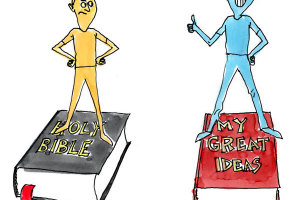America and the West: What is the cultural glue?

Major sections of libraries have been filled with volumes seeking to identify, examine and evaluate the various sources that ultimately coalesce into the broad category of “Western civilization.”
Previous generations studied summaries of that research in textbooks at both the secondary and collegiate levels. Educators considered it essential that students understand the basic tenets upon which Western society was based and how they came to be. In other words, what made “Western” civilization different from other civilizations and why its basic tenets and values were beneficial to humankind.
Of course, at this point in our history in America and the rest of the West, such assumptions and ideas have been under withering attack for at least two generations. Many of us remember countless scenes like the Rev. Jesse Jackson leading a demonstration of hundreds of students at Stanford University in 1987 chanting, “Hey, hey, ho, ho, Western civ has got to go!” Almost four decades later, these radicals have achieved their goals. The study of Western civilization in any meaningful way has been forcefully expunged from the nation’s secondary and collegiate educational systems. It is as if “Western civ” is “gone with the wind.”
Western civilization was deemed “white man’s history,” racist, bigoted and needed to be expunged and replaced with myriad ethnic studies of oppressed peoples. Consequently, for example, you have attempts to honor Native American heritage in California by honoring and studying the Aztecs, a civilization mired in, among other things, human sacrifice. How such practices help the nation achieve its motto, “E pluribus unum – out of many, one” seems inexplicable.
Every year, the United States welcomes nearly 1 million new citizens through naturalization ceremonies. If you have not attended one, try to do so. It is a very moving experience to watch these new Americans (of multiple ethnicities) and their gratitude to and love for our blessed nation. To become a naturalized citizen, they must pass the American citizenship exam by answering six out of the 10 questions accurately. The questions are as follows:
1. “Who wrote the Declaration of Independence?”
2. “Who was the first President of the United States?”
3. “Who was the U.S. President during World War I?”
4. “When was the U.S. Constitution written?”
5. “How many years is the term of a U.S. Senator elected to serve?”
6. “How many amendments are there to the U.S. Constitution?”
7. “Which of these states does not border Canada?” (Alaska, Maine, North Dakota, Michigan, Montana, and Oregon are the options to choose from.)
8. “Which territory did the United States buy from France in 1803?” (Louisiana, Texas, California, Florida, Maine, and Alaska are the options provided.)
9. “Which branch of the government makes federal laws?” (Legislative, Executive, and Judicial are the options.)
10. “Which is not one of the rights and freedoms guaranteed by the First Amendment of the Constitution? (Speech, Religion, Assembly, Press, Petition of the government, and Bear Arms are the options.)
The test seems simple and straightforward. Yet, while nine out of 10 legal immigrants pass the test, only 30% of Americans and just 3% of U.S. public high school students can answer at least six of these 10 questions correctly. ("97% of students can’t pass this test," [email protected] Feb. 20, 2024).
Clearly, alarming numbers of Americans have little knowledge of our heritage or how or why we have the society we currently have.
Let us commence with an extremely abbreviated summary of Western civ. The world reached new levels of civilization and technical advancement during the Greek and Roman Empires. After the collapse of Rome, Europe struggled through centuries of decline, reversed by the Renaissance, a tremendous cultural and philosophical awakening during the 12th to 14th centuries in Italy and Southern Europe.
Then, as the saying goes, as the Renaissance crossed the Alps into Northern Europe, “it got religion,” i.e. the Reformation. Thus began a struggle over origins that continues to the present day. Both sides of the Renaissance desperately wanted to get back to the truths of their inspired origins, Greece and Rome, or “the Bible,” Humanism vs. Christianity.
Some would argue, myself among them, that the Reformation produced the English (17th century) and the subsequent American (18th century) Revolution, and the secular humanism of Greece and Rome produced the French Revolution. This struggle for this civilizational soul of Western civilization continues to the present day because both sides can legitimately appeal to aspects of their origins the Western civilization produced.
In the United States, and to a lesser extent, in the historically English-speaking countries, the Judeo-Christian-based value system predominated. When you read the writings of the Founding Fathers, these highly educated and well-read men read Greco-Roman classics, but they read Christian theology and philosophy as well. I was struck by this when I had the privilege of visiting Montpelier, the ancestral home of James Madison, our fourth president and one of the chief architects of the U.S. Constitution.
In virtually every room of the beautiful mansion were paintings depicting biblical scenes as well as Greco-Roman scenes. Madison was deeply well-versed in both. However, when you read the Constitution and Madison’s other writings, it is the Judeo-Christian Renaissance that held the intellectual upper hand.
Even the Founding Fathers who were less traditional in their faith, Jefferson and Adams, found in Judeo-Christian origins the belief in the divine origin of human rights for “all men.”
American civilization, as the most unadulterated Judeo-Christian form of Western civilization, while far from perfect, has produced a society with more rights for a higher percentage of the population than any society in human history. In what other countries do people routinely risk life and limb to enter, crossing oceans, jungles and deserts to grasp the American dream of freedom and dignity?
Interestingly, it is people who are not native-born Americans who are more sensitive to the critical role Judeo-Christian values have played in American civilization. Recently Nzube Olisaebuka Udezue, a British rapper known as “Zuby,” posted that he thinks “the West is absolutely screwed if it loses Christianity.”
Zuby went on to explain, “It’s like removing the foundations of a building but pridefully expecting it to remain standing forever … all while enemies both inside and outside are trying to knock the building over.”
He described Christianity as the West’s “immune system” and argued that Christianity’s dominance in the West has furnished “a form of herd immunity” that benefitted everyone. He wrote, “You can’t just have a culture and a moral vacuum … it goes against the laws of human nature.” This British citizen of Nigerian origin is absolutely right.
America at present reminds me of a murder mystery novel I read many years ago. The murder victim, a boating enthusiast, mysteriously drowned while out on a lake near his home. His boat sank and he drowned. Then it was discovered that his boat did not sink. It disintegrated — it just came apart in the middle of the lake. How could this have happened? Finally, the investigating detective discovered that the victim’s nemesis had secretly dismantled the victim’s boat and glued it back together with water-soluble glue.
So when the victim took his boat out on the lake, the glue slowly dissolved and the boat collapsed into the lake. I fear America is like a boat held together with soluble glue, and unless she returns to the shores of her cultural and spiritual foundations, she will break apart and sink beneath the waves.
Dr. Richard Land, BA (Princeton, magna cum laude); D.Phil. (Oxford); Th.M (New Orleans Seminary). Dr. Land served as President of Southern Evangelical Seminary from July 2013 until July 2021. Upon his retirement, he was honored as President Emeritus and he continues to serve as an Adjunct Professor of Theology & Ethics. Dr. Land previously served as President of the Southern Baptist Convention's Ethics & Religious Liberty Commission (1988-2013) where he was also honored as President Emeritus upon his retirement. Dr. Land has also served as an Executive Editor and columnist for The Christian Post since 2011.
Dr. Land explores many timely and critical topics in his daily radio feature, “Bringing Every Thought Captive,” and in his weekly column for CP.




























